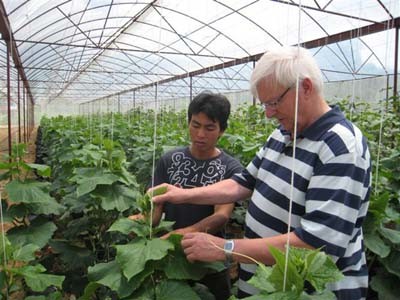(VOVWorld) Vietnam has been hailed as an outstanding example of agricultural development for developing countries at the 42nd World Economic Forum in Davos, Switzerland, thanks to government policies on agriculture and rural development over the past 25 years of renewal.
 |
| Thuy Huong Commune in Hanoi's Chuong My suburban district is implementing new rural model. Photo: nongthonmoi.gov.vn |
Since the 6th National Party Congress in 1986, agriculture and rural development has been playing a strategic role in the country’s socio-economic development. So far, Vietnam’s food production increased 150%compared to that of 1985 while meat production is 400% and forest coverage is 200% higher. Agricultural production not only ensures sufficient supply to meet domestic demand but also contributes a great deal of Vietnam’s exports. In particular, food commodities made a great leap forward after the 10th National Party Congress’ Resolution allowed farmers better access to land, forest, sea, and water resources for production, along with incentive policies on free trade and investment. From a country suffering famine and food crisis, Vietnam has managed to become rice self-sufficient and the world’s 2nd largest rice exporter. Hoang Binh Quan, Head of the External Relations Commission of the Party’s Central Committee says:“Agriculture has proved to be important for Vietnam throughout the rising and falling tide of history. It is essential for Vietnam’s construction and defense, and has helped the country escape famine and gain a strong position in the international arena”.
Dang Kim Son, Head of the Institute of Policy and Strategy for Agricultural and Rural Development attributes the breakthroughs of Vietnam’s economy to the market economy mechanism. He says political and social stability in the midst of world upheaval can help reduce poverty by 2% a year. He added rural agricultural development contributes a great deal to ensuring stability. “In the market economy, enterprises work more efficiently. As a result, people are ready to make every effort and invest money for even better outcomes. It is not common for farmers’ rice production to exceed that of state-owned research institutes as happened in Vietnam. We also have a higher production in shrimp, Basa fish and coffee than most other countries in the world. Once production is profitable, farmers can invest and acquire new technology very quickly to tap the market efficiently,” he says.
Vietnam has done a great job of developing key economic regions. The forest conversion project has created stable jobs and increased incomes for millions of laborers, particularly people from ethnic groups. In 2008, following the issuance of Party resolution 26 on agriculture, farmers, and rural areas, a program was piloted in 11 communes nationwide to test new production methodologies, mechanisms, and policies. This pilot program has proven a success. Vietnam has developed a 10-year program to develop new rural areas with the aim of having 20% of all communes nationwide adopt the new rural area model. The pilot model of large-scale rice field in An Giang was another success that other provinces in the Mekong Delta have imitated. Mr. Dang Kim Son said: “We’ve recognized the great significance of the agricultural and rural economy to create economic breakthroughs. Agriculture will experience an unprecedented growth in the future because the prices of agricultural products will continue to rise in the next 50 years due to climate change and fuel exhaustion.”
Anh Huyen